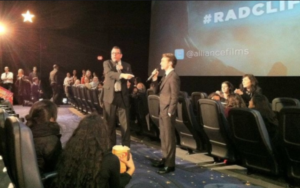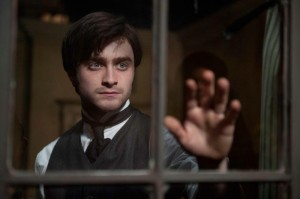TWELVE YEARS AGO TODAY: IT’S NOT ABOUT DANIEL RADCLIFFE or HARRY POTTER.
 Twelve years ago tonight, at the 2012 Canadian premier of The Woman in Black a young woman yelled, “I love you!” as Daniel Radcliffe and I took the stage to introduce the film.
Twelve years ago tonight, at the 2012 Canadian premier of The Woman in Black a young woman yelled, “I love you!” as Daniel Radcliffe and I took the stage to introduce the film.
“I love you too,” he replied with a smirk. “But I think we should see other people.”
The audience laughed but probably missed the double meaning of his comment. For ten years Radcliffe was the face of Harry Potter, one of the biggest grossing movie franchises ever. Potter ended in 2011 (for Radcliffe, anyway) and the actor has moved on, and hopes his audience will follow along.
Radcliffe has perspective on where he’d like his career to go, but what about the fame that came along with playing Harry Potter? The next day after The Woman in Black premier I asked him about the screaming fans that greeted him and what that does to his ego.
“The thing you have to remind yourself is that it’s not about me. It’s about the fact that I played this character who became beloved. Anyone who took on this character would be getting this reaction. When I’m home, smoking a cigarette and it’s cold and I’m eating half a pizza. You have to take a picture of yourself then and play it to yourself when you’re on the red carpets and go, ‘Yeah, you’re not all that.’”
Radcliffe is not being modest when he says “it’s not about me,” just realistic. He understands his role in bringing the iconic character to life. The actor’s mix of vulnerability and strength won him the part and imprinted the journey from young kid to powerful wizard in the imaginations of millions of people. Had he not been cast as Harry he may or may not have found fame in some other way and someone else would likely be getting all the attention instead of him. That is the luck of the draw.
Eventually he’ll be able to walk down the street again, perhaps pick up a slice without being mobbed by eager fans but when we hosted the Woman in Black event in 2012 that tide had not yet turned.
After we introduced the movie we made our way back to the greenroom. A young woman, unaware of that Radcliffe was in the building, spotted us. Her reaction has stayed with me. Agog, she was a mix of disbelief, excitement and raw nerves. She was the definition of the word verklempt come to life. Unsure why Harry Potter was standing in front of her near the concession stand, she burst into tears and ran toward him with arms extended. He sidestepped her, while still acknowledging her excitement, and we quickly hoofed it to safety, doubtlessly leaving the young Potter fan to wonder whether she was hallucinating or not.
In the greenroom I asked him if that happens all the time. It does, he said, and then detailed some of the tricks he’s learned about not making eye-contact and how a hoodie can be an effective disguise for a late-night convenience store run. In the post Potter phase of his career Radcliffe plays a waiting game, confident in the knowledge that a burning match does not stay hot forever. He’s learned to deal with the attention and is able to cope with it because knows that it will pass.
Acceptance and understanding of situations, whether it is an excited fan tackling you or wanting to smoke when you’re trying to quit or great personal loss or business collapse, can help you find the solutions that will help you deal with whatever’s troubling you.
The lesson here is whatever happens in life, whether it is international stardom or any other of the more mundane things that touch our daily lives, the feeling is likely transitory.
Many of us live in the moment. Beautiful times are amplified. Conversely, bad stuff often feels permanent, as though it will be like this forever. It’s easy to get caught up in the moment but taking time out to think about what’s really happening is the great leveller. Perspective allows us to deeply enjoy the good times and, in bad times, reassures us that it will not always be this way. As classical pianist Arthur Rubinstein says, “there is no formula for success except, perhaps, an unconditional acceptance of life and what it brings.”
Radcliffe accepts his life but understands that fame does not define him. “I think it’s very important,” he told The Independent, “especially when you become famous young, to work out who you are without fame and without that as part of your identity, because that will go. Fame does not last forever. For anyone.”
He’s right. I recall doing a junket in Los Angeles for an unremarkable coming-of-age story with a gangland twist called Knockaround Guys. It’s the story of four sons (Vin Diesel, Seth Green, Barry Pepper, and Andrew Davoli) of Brooklyn mobsters bond together to reclaim a quarter of a million dollars lost in a small Montana town. Dennis Hopper plays cigar chomping mob boss Benny “Chains” Demaret.
Hopper’s appearance is little more than a cameo, but casts a big shadow. Here was an Actors Studio alum who made his first television appearance in 1954. He’s legend who helped do in the studio system by directing Easy Rider, appeared alongside James Dean in Rebel Without a Cause and Giant and was legendarily stoned on the set of Apocalypse Now.
On the day of the junket I sat with the other interviewers, largely lifestyle reporters, waited in the hospitality room waiting to be called. A publicist rolled into the room, clipboard in hand. “Jane Doe,” she said, “you’re on deck to interview Mr. Hopper.”
“Who?” said Jane. “I’m really only here to talk to Seth Green.”
Almost half a century of work, awards and thousands of column inches in the tabloid press shunted aside for the guy who created Robot Chicken. Radcliffe is right. Fame is fleeting.
Radcliffe breathes rarified air and reportedly enjoys a substantial bank account but the questions he grapples with maybe different than you and I but awareness of life situations is crucial to all, whether wizard or muggle.

